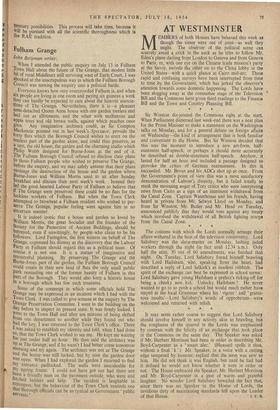AT WESTMINSTER M EMB ' RS of both Houses have behaved this week
as though the times were out of joint—as well they might. The observer of the political scene can scarcely avoid a crick in the neck as he tries to follow Mr. Eden's plane darting from London to Geneva and from Geneva to Paris; or, with one eye on the Chinese trade mission's party at the Savoy, swivels the other on to the China lobby in the United States—with a quick glance at-Cairo mid-arc. These rapid and confusing surveys have been interrupted from time to time by the Government, which has jerked the observer's attention towards some domestic happening. The Lords have been slogging away at the committee stage of the Television
Bill and the Commons have third readings to the Finance Bill and the Town and Country Planning Bill.
* * *
Sir Winston dis-jointed the Commons right at the start. When Parliament dispersed last week-end there was a neat plan for the Prime Minister to make a statement on the Washington talks on Monday, and for a general debate on foreign affairs on Wednesday—the kind of arrangement that is both familiar and convenient to the House. But Sir Winston decided that this was the moment to introduce a new art-form, half- statement half-speech; or perhaps it should more accurately be described as double-statement half-speech. Anyhow, it lasted for half an hour and included a passage designed to provoke the critics of German rearmament. In this it succeeded. Mr. Bevan and his ADCs shot up at once. From the Government's point of view this was a most satisfactory demonstration of Labour's disunity, but it failed totally to mask the mounting anger of Tory critics who were interpreting news froth Cairo as a sign of an imminent withdrawal from the Canal Zone. Captain Waterhouse and his friends, having heard in private from Mr. Selwyn Lloyd on Monday, and from Sir Winston, Mr. Butler and Mr. Head on Tuesday, announced publicly that they would vote against any treaty which involved the withdrawal of all British fighting troops from the Canal Zone.
* * * The cosiness with which the Lords normally arrange their affairs-withered in the heat of the television controversy. Lord Salisbury was the slave-master on Monday, lashing jaded workers through the night (in fact until 12.34 a.m.). Only half the stint, 30 out of 60 amendments, was finished that night. On Tuesday, Lord Salisbury found himself brawling with Lord Hailsham, who, speaking from the heart, had described a reply of Lord Selkirk's as insolent rubbish. The spirit of the exchange can best be expressed in school terms: Lord Salisbury gave young Hailsham a prefect's ticking-off for being a cheeky new kid. Unlucky Hailsham 1 He never wanted to go to so posh a school but would much rather have stayed at the local Grammar where his ' vigour ' and 'gratui- tous insults'—Lord Salisbury's words of opprobrium—were welcomed and returned with relish.
* * * It may seem rather coarse to suggest that Lord Salisbury should involve himself in any activity akin to brawling, but the roughness of the quarrel in the Lords was emphasised by contrast with the felicity of an exchange that took place in the Commons on the same day. The Speaker was asked if Mr. Herbert Morrison had been in order in describing Mr. Boyd-Carpenter as a smart alec.' (Hansard spells it thus, without a final k'.) Mr. Speaker, in a voice with a cutting edge tempered by humour; replied that the term was new to him. He did not think it was English. but until he had had it defined he would not know whether it were in order or not. The House embraced the Speaker, Mr. Herbert Morrison and Mr. Boyd-Carpenter in a gust of warm and grateful laughter. No wonder Lord Salisbury bewailed the fact that, since there was no Speaker in the House of Lords, the invidious duty of maintaining standards fell upon the Leader


































 Previous page
Previous page